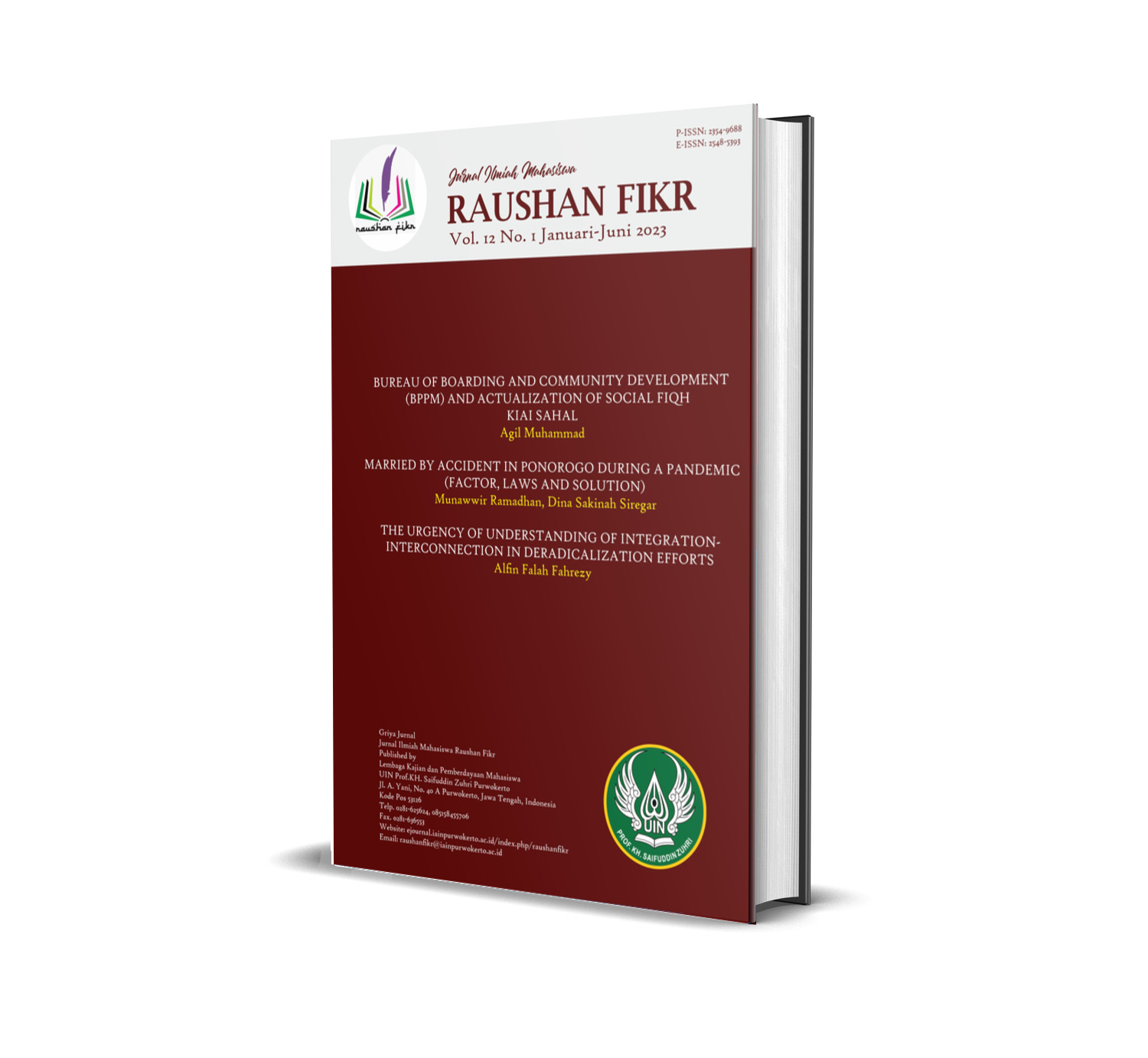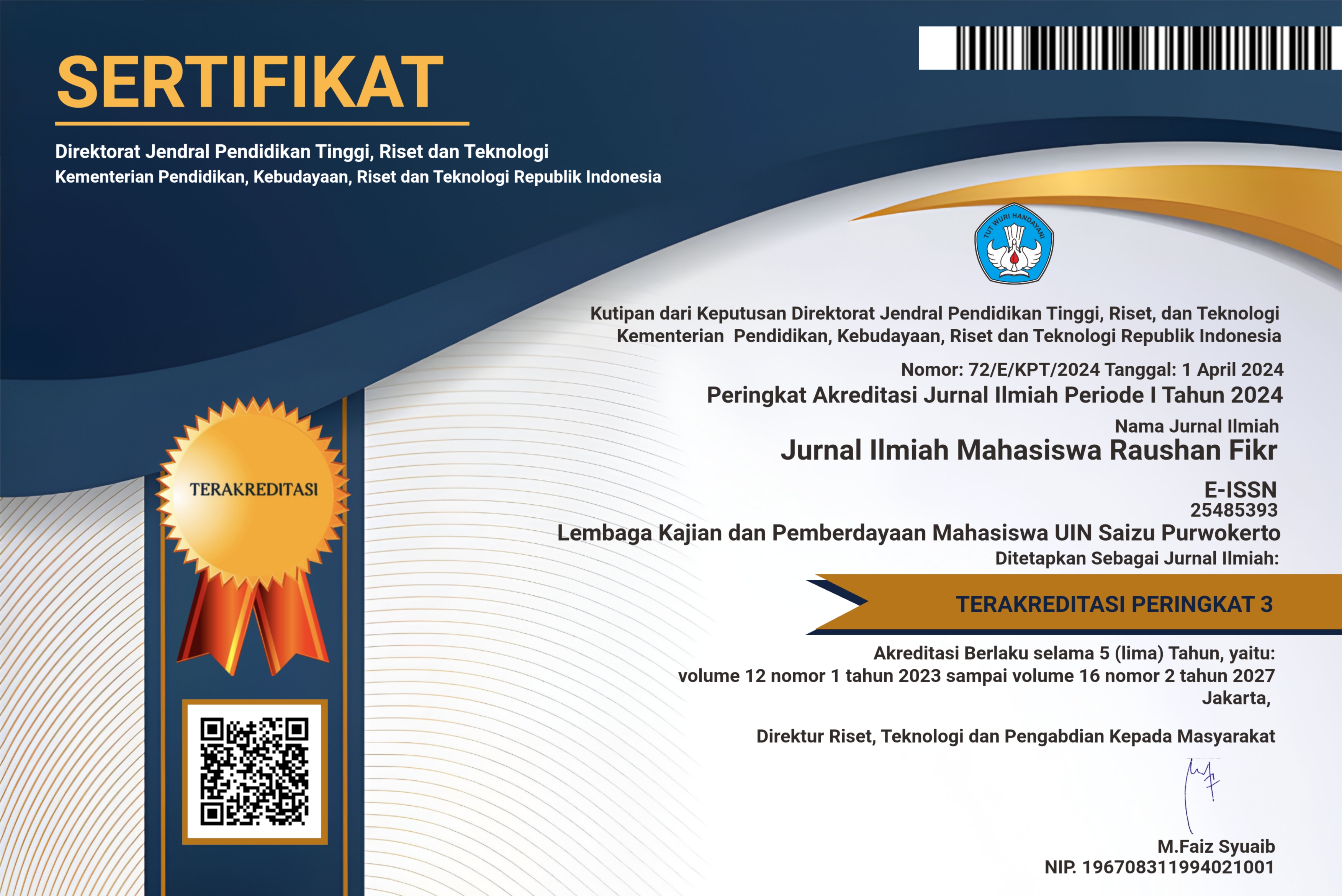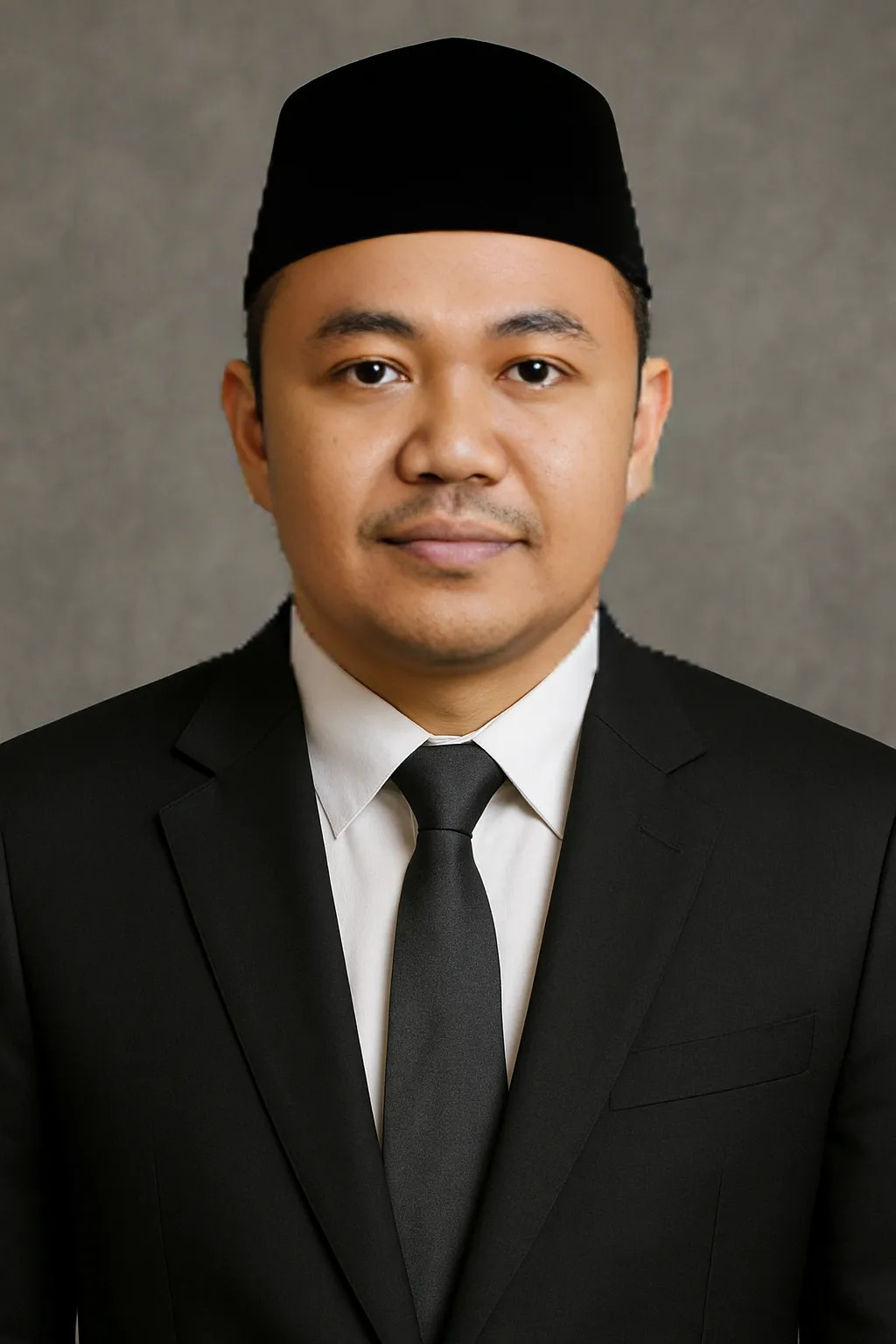Bureau of Boarding and Community Development (BPPM) and Actualization of Social Fiqh Kiai Sahal
DOI:
https://doi.org/10.24090/jimrf.v12i1.5313Keywords:
BPPM, Fiqh Sosial, Kiai Sahal, Tindakan SosialAbstract
This paper attempts to analyze the concept and actualization of Kiai Sahal’s social fiqh within the BPPM institution which is linked to his social movement through analysis of Max Weber’s theory of social action which aims to understand the motives and goals of the perpetrator, namely Kiai Sahal, in pioneering and developing BPPM. From the study conducted, it can be seen that Kiai Sahal sees the need for fiqh in overcoming the problems of community life as a form of maslahah al-ammah and the realization of sa’adah al-darain. Kiai Sahal’s movement in community empowerment through BPPM is included in the category of instrumental rationality social action, because this social movement begins through a process of calculation and consideration in the form of reading the social reality of the surrounding community and this action has the aim of strengthening social, economic, educational, and health aspects that support perfection of worship, which is the actualization of Kiai Sahal’s social fiqh thinkingDownloads
References
Al-Ansari, Zakariya. n.d. Gayah al-Wusul. Surabaya: Al-Haramain.
Al-Bannani, Abdurrahman. 2012. Hasyiyah Al-Bannani. Beirut: Dar al-Fikr.
Al-Mahalli, Jalaluddin. n.d. Syarh al-Mahalli “ala Matn Jam” al-Jawami’.
Al-Qasimi, Muhammad Jamaluddin. n.d. Mau’idah al-Mu’minin min Ihya’ ‘Ulum al-Din. Surabaya: Imaratullah.
Al-Suyuthi, Jalaluddin. n.d. Al-Asybah wa al-Nazair fi al-Furu’. Surabaya: Al-Haramain.
Asmani, Jamal Ma’mur. 2014. “Implikasi Fiqh Sosial Kyai Sahal Mahfudh Terhadap Pembaharuan Fiqh Pesantren di Kajen Pati.” Yudisia 5(1).
Asmani, Jamal Ma’mur. 2015. “Fiqh Sosial Kiai Sahal Sebagai Fiqh Peradaban.” Wahana Akademika 2(2).
Asmani, Jamal Ma’mur. 2020. Biografi Intelektual KH. MA. Sahal Mahfudh: Pergulatan Fiqh Sosial dalam Realitas Empiris. Yogyakarta: Global Press.
Aulia, Arief. 2017. “Metodologi Fiqh Sosial M. A. Sahal Mahfudh.” el-Mashlahah 7(2).
Baroroh, Umdah El. 2020. “Understanding Methodology of Fiqh Sosial.” Santri 1(1).
Baroroh, Umdah El, dan Tutik Nurul Jannah. 2016. Fiqh Sosial: Masa Depan Fiqh Indonesia. Pati: STAIMAFA Press.
Harisudin, M. Noor. 2016. “Rekonstruksi Fiqh dalam Merespon Perubahan Sosial.” Asy-Syir’ah 50(1).
Haryanto, Sindung. 2014. Sosiologi Agama: Dari Klasik Hingga Postmodern. Yogyakarta: Ar-Ruzz Media.
Ismail. 2019. “Eksistensi Ushul Fiqh dalam Tafsir Realitas Sosial dan Peranan Pesantren dalam Menjaga dan Mengembangkannya.” Alhurriyah 4(1).
Jannah, Tutik Nurul. 2014. “Inspirasi Gerakan Ekonomi Kiai Sahal Mahfudh.” in Epistemologi Fiqh Sosial: Konsep Hukum Islam dan Pemberdayaan Masyarakat, diedit oleh M. Aziz. Pati: Fiqh Sosial Institute.
Jannah, Tutik Nurul. 2015. “Ijtihad Jama’i Sebagai Model Gerakan Sosial Kiai Sahal.” in Metodologi Fiqh Sosial: Dari Qouli Menuju Manhaji, diedit oleh T. N. Jannah. Pati: STAIMAFA Press.
Jannah, Tutik Nurul, dan Umdah El Baroroh. 2021. “Pluralism in the Fiqh Sosial’s Perspective.” Santri 2(1).
Jones, Pip. 2003. Pengantar Teori-Teori Sosial: Dari Teori Fungsionalisme Hingga Post-Modernisme. Jakarta: Pustaka Obor.
Junaidy, Abdul Basith. 2009. “Revitalisasi Ushul Fiqh dalam Menghadapi Perubahan Sosial.” Islamica 3(2).
Kustiana, Erika, dan Maslikhatul Ummah. 2016. “KH. MA Sahal Mahfudh, Mengenal Sosok Kiai Sahal: Dari Kerupuk Tayamum Hingga BPR Artha Huda Abadi.” in Islam Nusantara dalam Tindakan: Samudra Hikmah Kiai-Kiai Kajen, diedit oleh M. Aziz dan F. Abbad. Pati: Institute Pesantren Mathali’ul Falah.
Labib, Muhammad. 2020. “Analyzing Rejection of Corpse Infected by COVID 19 In The Perspective of Moral Panic and Fiqh Sosial Theories.” Santri 1(1).
Mahfudh, MA. Sahal. 2011. Nuansa Fiqh Sosial. Yogyakarta: LKiS.
Muntaqo, Lutfan. 2014. “Fiqh Sosial: Pemikiran KH. MA. Sahal Mahfudh.” Manarul Qur’an 14(1).
Nazar, Reza Fauzi. 2021. “Corak Pembaruan Pemikiran Hukum Islam dalam Konsep ‘Fiqh Sosial’ K.H Sahal Mahfuh.” Asy-Syari’ah 23(1).
Nugroho, Anjar. 2005. “Fikih Kiri: Revitalisasi Ushul Fiqh untuk Revolusi Sosial.” Al-Jami’ah 43(2).
Qurtuby, Sumanto Al. 2017. KH MA Sahal Mahfudh Era Baru Fiqih Indonesia. Semarang: eLSA Press.
Ritzer, George. 2009. Sosiologi Ilmu Pengetahuan Berparadigma Ganda. Jakarta: RajaGrafindo Persada.
Rohmah, Nurur. 2017. “Memahami Fiqh Sosial KH. MA Sahal Mahfudh ‘Fiqh Sebagai Etika dan Gerakan Sosial.’” Islam Nusantara 1(1).
Rohman, Taufiqur. 2020. Ijtihad Tathbiqi KH Sahal Mahfudh Sebagai Pengembangan Masa Depan Fiqh Indonesia. Yogyakarta: Aswaja Pressindo.
Rusli, Almunauwar Bin. 2018. “Nalar Ushul Fiqh KH. Sahal Mahfudh dalam Wacana Islam Indonesia.” Potret 22(2).
Supraja, Muhammad. 2012. “Alfred Schutz: Rekonstruksi Teori Tindakan Max Weber.” Jurnal Pemikiran Sosiologi 1(2).
Turner, Bryan S. 2012. Teori Sosial dari Klasik Sampai Postmodern. Yogyakarta: Pustaka Pelajar.
Downloads
Published
How to Cite
Issue
Section
License
Copyright (c) 2023 Agil Muhammad

This work is licensed under a Creative Commons Attribution-NonCommercial-ShareAlike 4.0 International License.
Authors who publish with this journal agree to the following terms:
- Authors retain copyright and grant the journal right of first publication with the work simultaneously licensed under a Creative Commons Attribution-NonCommercial-ShareAlike 4.0 International License that allows others to share the work with an acknowledgement of the work's authorship and initial publication in this journal.
- Authors are able to enter into separate, additional contractual arrangements for the non-exclusive distribution of the journal's published version of the work (e.g., post it to an institutional repository or publish it in a book), with an acknowledgement of its initial publication in this journal.
- Authors are permitted and encouraged to post their work online (e.g., in institutional repositories or on their website) prior to and during the submission process, as it can lead to productive exchanges, as well as earlier and greater citation of published work (See The Effect of Open Access).
















